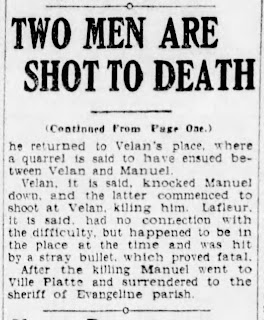 |
| The Shreveport Times Oct 30, 1928 |
Toi 'tit monde, yaille, fais pas ça, malheureuse,
Toi 'tite fille, jongle à moi avant d'faire ça.
Toi 'tit monde faut pas te jongles à ton papa et avec ta maman.
Mais écoute pas avec ton papa et avec ta maman.
Malheureuse, si t'écoutes ton papa et après ta maman,
Tu s'ras jamais heureuse.
Ah, ye yaille, qui j'ai fait à ton papa, après ta maman,Pour m'haïr autant qu'ça .Moi j'connais j'ai pas fait rien ton papa, chère,Toi 'tite fille, faut' qu'tu jongles à tout ça.Toi 'tite fille, moi j'crois pas t'as le cœurAussi criminel que ça, malheureuse.Rappelle-toi, petite fille, chère,J't'avais dit tu vas jamais faire ça.'Garde donc qui t'as fait avec mon y a pas si longtemps ?Malheureuse t'aurais pas dû faire tout ça.Toi 'tite fille, j'suis parti m'en aller, yaille,M'en aller à la maison avant longtemps.
 |
| Mayuse Lafleur |
Mayuse had allegedly told Victor A&R representative Ralph Peer that he couldn't sing without having something to drink. According to their sponsor, Frank Dieltein:
It was during Prohibition and of course, we did not know where to find anything to drink. Finally, Peer found a taxicab driver who was willing to get a bottle of what he called 'mountain dew' for $5. Taking the bottle to Mayuse, he handed it to him saying, "This is all we could get."5
I'll never forget how Mayuse looked at the bottle and took a deep drink. For about 15 minutes the musician kept taking drinks from the bottle. Finally, I noticed that his right foot began to tap on the floor in rhythm as if he were humming to himself. At last, he looked at his partner, smiled, and raised his accordion and squeezed a chord as a signal that hew was ready. The two musicians struck up several more chords and then told the Victor recording engineer that they were ready to start making the record.5
Nine days later, the two played a house dance in Basile. On the way home, they stopped at a "blind tiger" (illegal drinking establishment) run by Alexander Bellon. A violent fight broke out between gamblers shortly after the duo arrived and Lafleur was killed in the melee. Soileau cradled his dying friend's head on the blood soaked bar floor. It haunted him the rest of his life.
You, my everything, oh, don't do that, oh my,
You, little girl, remember me before doing this.
You, little girl, should not reminiscence about your papa and your mama,
However, listen! Not with your dad and with your mom.
Oh so sad, if you listen to your dad and also your mom,
You'll never be happy.
Ah, oh, what did I do to your father, also, your mother,For them to hate me that much.I know I have not done anything to your father, dear.You, little girl, you must remember all of that.You, little girl, I don't reckon you have the heart,To be criminal as that, oh my.Remember, dear little girl,
The Shreveport Times
Oct 30, 1928I told you to never do that.Just look at what you did with me, not so long ago?Oh my, you'd not have done all that.You, little girl, I'm gone, oh!I'll be going home before long.
Although LaFleur's style of playing was different from Anglelas and Iry LeJeune's music, there is some of the quality of loneliness in those two men's recordings. LaFleur cut the only two records he made in 1928, the year he died. In fact according to Leo Soileau who accompanied him on the fiddle, he never heard his records.4 It must have made some sort of impression on other musicians since the following year, Artelus Mistric used the melody for his Victor recording of "Belle Of Point Clare". By 1936, Leo and the Shreves formed the Four Aces and re-recorded the song as a string band tune entitled "Je M'Ennui Ce Soir". By 1951, Amede Breaux covered the tune for J.D. Miller of Crowley as the "Criminal Waltz".
- Louisiana Fiddlers By Ron Yule
- Early American Cajun Music: The Early Recordings Of Leo Soileau. Liner notes.
- Lyrics by Marc C and Herman M
- Discussions with Pete B
- Daily World (Opelousas, Louisiana) 17 Dec 1967, Sun Page 4
Find:
Early American Cajun Music: The Early Recordings of Leo Soileau (Yazoo, 1999)
The Early Recordings of Leo Soileau (Yazoo, 2006)
Cajun: Essential Guide (Union Square, 2007)
The Early Recordings of Leo Soileau (Yazoo, 2006)
Cajun: Essential Guide (Union Square, 2007)


No comments:
Post a Comment
Got info? Pics? Feel free to submit.